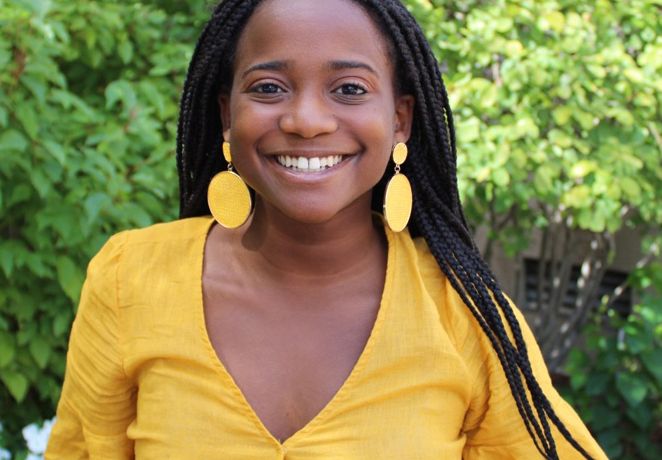
Photo by Julian Zhu.
A Revision to the Writing Program
Director Michael Dowding is looking to build on a COM legacy
Michael Dowding spent his first year as director of COM’s Writing Program looking for ways to improve how the college teaches writing. But what does a school known for producing Pulitzer-winning journalists and decorated copywriters need to improve on?
“[Dean] Mariette DiChristina loves to say that when she talks to alums about the most important thing they remember from COM, they all say ‘writing,’” says Dowding (MET’85, COM’90). “This is a way to fortify the way we deliver that writing instruction.”
The Writing Program is run by a small group of faculty that includes Dowding; Dana Janbek, communication director and a master lecturer in mass communication, advertising and public relations, and media science (MCAPR); Stephanie Schorow, a lecturer in MCAPR; Kathryn Burak and Lisa Liberty Becker, both master lecturers in journalism; and administrator Erica Gartelmann. They’re responsible for six courses, from CO 201 Introduction to Communication Writing up to CM 707 Writing for Media Professionals, plus the COM Writing Center, where students can get help with their written coursework, which is managed, ad interim, by John Hall, a master lecturer in film & television. Dowding, a master lecturer in MCAPR, estimates that the program’s faculty, including dozens of adjunct professors, teaches nearly 100 sections of their courses annually.
Dowding spoke with COMtalk about the ongoing process of reviewing and strengthening COM’s writing instruction.
Q&A
With Michael Dowding
COMtalk: Writing has always been a strength of the COM curriculum. What prompted a review?
Michael Dowding: We want to make sure that we’ve got uniformity in our curriculum from section to section. Some variability can be good, but too much variability can be a barrier. So we’re trying to thread that needle. Altogether, we have more than 800 students enrolled in these classes. It’s a very big mandate and we are overseeing a lot of moving parts. It’s very exciting and fun.
COMtalk: As you analyzed writing instruction at COM, what stood out?
Michael Dowding: We have tremendous institutional support for writing in our curriculum. But we have an opportunity to do more blending of the different writing classes, which have been managed in independent silos. One of the mandates of my position is to break down those silos. For instance, if you were hired to teach CO 201, that’s what you taught. And if you were hired to teach CM 331, that’s what you taught. One of the big opportunities is cross-training of faculty so that we aren’t operating in silos and there’s a much broader vision for what a COM student experiences through their writing journey.
COMtalk: How will you accomplish that?
Michael Dowding: One thing is to provide more centralized resources for our faculty. We want to have an open-source library of materials—everything from quizzes and presentations to textbook recommendations and sample syllabuses. And we’ve launched a writing summit every year where we have dozens of writing faculty come together. We just did this in August. We talk about writing issues and, as you can imagine, one of the big ones we’re wrestling with is artificial intelligence.
COMtalk: Are there other changes coming to the program?
Michael Dowding: We’re expanding our full-time staffing significantly. When I started, it was myself and two others. We added Stephanie Schorow last year, and we’re going to be hiring as many as four more full-time lecturers in the coming year.
We also completed a review of the Writing Center, and we found an opportunity to raise our game with respect to training our tutors. We’re going to develop and propose a tutoring fundamentals class for the tutors that we hire from the graduate student ranks. And COM already has experiential learning opportunities like PRLab, AdLab and COMLab, so we’re rebranding the Writing Center as the WritingLab.
COMtalk: Beyond strengthening existing programs, have you introduced any new initiatives?
Michael Dowding: One of the biggest additions has been our Writer in Residence Program. We welcomed a Pulitzer Prize winner in our first year and an Emmy-nominated screenwriter in our second year. It’s a real treat to have somebody come in from the outside and validate what we’re talking about. It’s meant to help students envision how a writing-centric career can work. We want to unleash their imaginations.
COMtalk: You mentioned artificial intelligence earlier. How is the Writing Program approaching the use of generative AI?
Michael Dowding: Generative AI is raising uncomfortable questions about writing. One is: Are we going to focus on process or merely output? There’s a consensus, but I won’t say it’s unanimous, that writing classes are unique with respect to generative AI. It doesn’t teach you how to write; it teaches you to avoid writing. And so how do we handle this? It’s about creating different processes for submitting work. We could retreat to blue books and pen and ink. The COM Writing Program is redoubling its efforts to make sure that we teach students the process. In the walled garden of a writing course, I don’t think generative AI has any meaningful role.
COMtalk: What’s your goal for the Writing Program?
Michael Dowding: This is sort of a lofty, long-term thing, but I imagine a scenario where a graduate enters a career in media and somebody looks at their writing and says, “I can tell you’ve been educated at COM.” There’s going to be distinguishing characteristics of their writing that are emblematic of this multicourse progression. I want them to see bulletproof mechanics where spelling, punctuation, and grammar are flawless. Without those, the content is obscured. I want them to see an appropriate voice in that writing, one that’s geared toward an audience. And I want them to see a thoughtful understanding of the content, where the writer has undertaken the difficult work of understanding what they’re writing about. That’s the vision that I have.
This interview has been edited for brevity and clarity.


